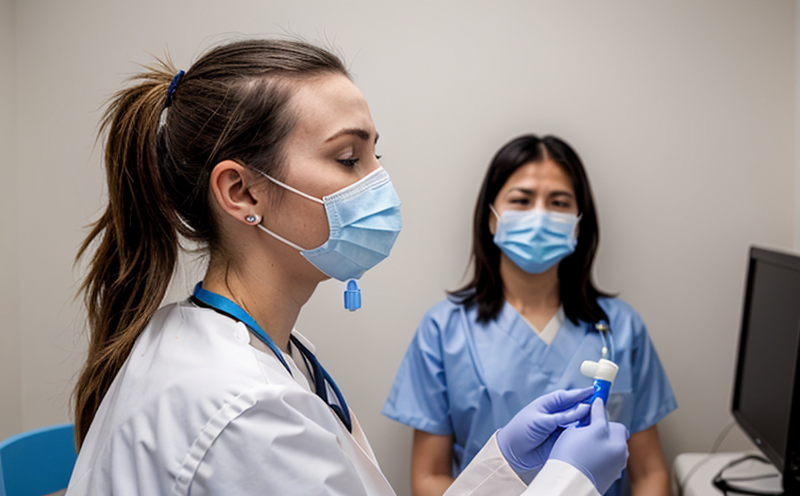Respiratory Syncytial Virus (RSV) Testing in Veterinary Animal Models
The respiratory syncytial virus (RSV) is a significant pathogen affecting both humans and animals, particularly young children and immunocompromised individuals. In veterinary settings, RSV can impact various species, including dogs and cats, leading to severe respiratory distress. Accurate and timely diagnosis of RSV infection in these animal models is crucial for effective treatment and management.
EuroLab offers comprehensive testing services for RSV in veterinary animal models using advanced diagnostic methodologies. Our state-of-the-art laboratory facilities ensure precise and reliable results, providing critical insights into the prevalence and impact of RSV within different species.
Our testing process involves several key steps: sample collection, transport, and preparation; nucleic acid extraction; quantitative PCR (qPCR) analysis; and result interpretation. This multi-step approach guarantees high accuracy and reproducibility in detecting RSV RNA. The use of qPCR allows for sensitive detection at low viral loads, making it ideal for diagnosing early-stage infections.
For effective diagnosis, we recommend collecting nasopharyngeal swabs or saliva samples from affected animals. These specimens are then transported to our laboratory within 24 hours of collection to maintain optimal RNA integrity. Once received, the samples undergo rigorous processing using our specialized equipment and reagents, ensuring consistent quality across all tests.
The qPCR assay used at EuroLab is based on the primers and probes designed specifically for RSV detection according to international standards (ISO 15146-2). This ensures that our results align with globally accepted guidelines for accurate diagnosis. Our experienced technicians perform the assays meticulously, ensuring high specificity and sensitivity.
The testing process typically takes approximately three days from sample receipt. During this time, we carefully analyze each reaction to ensure accurate quantification of RSV RNA. If necessary, additional confirmatory tests can be performed using next-generation sequencing (NGS) techniques for further validation.
Understanding the dynamics of RSV in veterinary populations is essential for developing effective control strategies and treatments. By providing reliable diagnostic services, EuroLab supports research efforts aimed at improving our understanding of this virus’s behavior in various animal species. Our commitment to accuracy and reliability makes us a trusted partner for healthcare professionals seeking precise information about RSV infections.
Industry Applications
| Veterinary Species | Detection Methodologies | Applications |
|---|---|---|
| Dogs and Cats | Quantitative PCR (qPCR) | Evaluation of vaccine efficacy; monitoring disease outbreaks |
| Poultry | Nucleic Acid Extraction; Real-Time qPCR | Surveillance for RSV in poultry populations; identification of reservoir hosts |
| Horses | Next-Generation Sequencing (NGS) | Investigation into zoonotic transmission pathways; evaluation of diagnostic assays |
The ability to accurately detect RSV in different veterinary species has numerous applications, including evaluating vaccine efficacy, monitoring disease outbreaks, and identifying potential reservoir hosts. This knowledge is vital for developing targeted interventions aimed at preventing the spread of this virus among animals.
By leveraging our advanced diagnostic tools and expertise, EuroLab plays a pivotal role in advancing research into RSV biology and its impact on animal health. Our services support various studies that aim to understand the epidemiology of RSV within veterinary settings better and contribute to improved preventive measures and therapeutic approaches.
EuroLab Advantages
At EuroLab, we pride ourselves on offering unparalleled quality assurance in all our testing services. Our team comprises highly skilled professionals who are dedicated to delivering accurate and timely results every time. With years of experience in the field, they bring extensive knowledge and expertise to each project.
Our facility is equipped with cutting-edge technology that ensures precise measurements and reliable data collection throughout the testing process. This includes automated sample preparation systems, advanced qPCR machines capable of high-throughput analyses, and state-of-the-art sequencing platforms for comprehensive viral profiling.
Moreover, our commitment to excellence extends beyond just technical proficiency; we also emphasize prompt communication with clients regarding their test results. Timely feedback helps ensure that any necessary follow-up actions are taken swiftly, thereby minimizing potential risks associated with delayed diagnoses.
In addition, EuroLab adheres strictly to international standards such as ISO 15146-2 when conducting RSV tests on veterinary animal models. This ensures consistency and reliability of our results while maintaining compliance with regulatory requirements worldwide.
By choosing EuroLab for your respiratory syncytial virus testing needs in veterinary settings, you can rest assured that you're partnering with a reliable and experienced organization dedicated to providing top-notch laboratory services.





